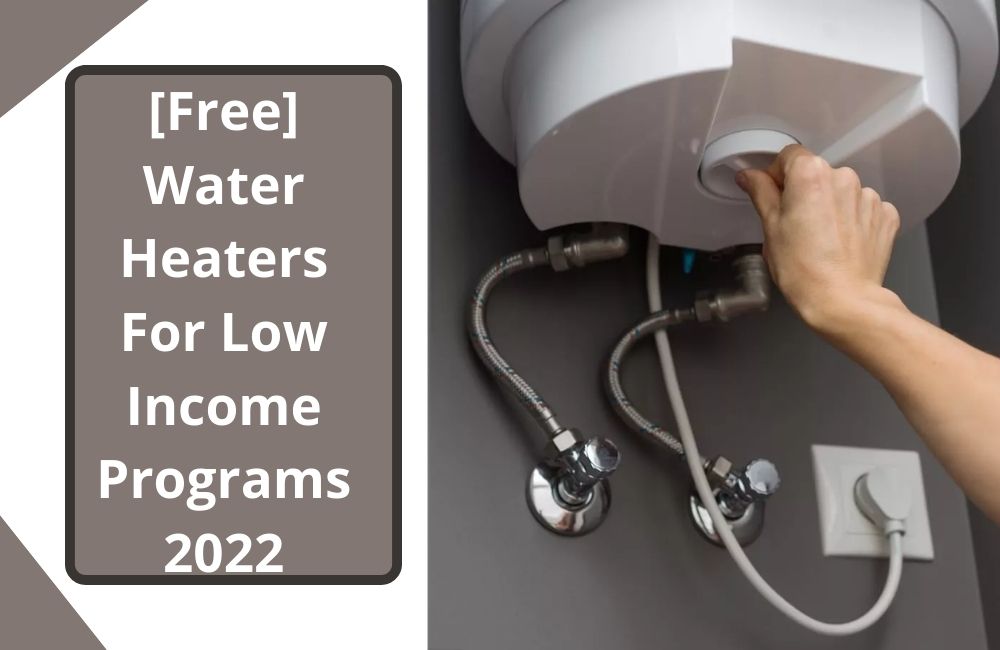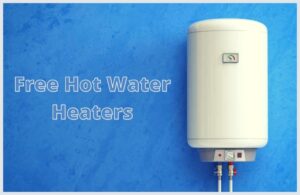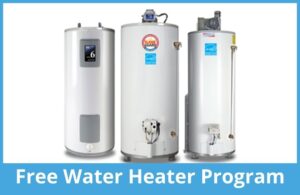You can get hot water all winter free water heaters for low income families provided by various charitable organizations. Heating systems need to be ready for winter. If you’re worried about how to raise money for a new heater then this is not the situation. The government and other non-profits are providing water heaters free of charge to low-income families.
The United States of America offers its citizens the opportunity to enjoy hot water at their disposal whenever they need it through a variety of governmental and non-governmental agencies.
The government provides water heaters free of charge to low-income families. It also offers grants for HVAC systems or furnace replacement.
Contents
Government Programs Providing Free Water Heaters For Low-Income
Water heaters and heating systems are essential for every American citizen. Unfortunately, not everyone can afford the costs associated with these necessities.
These citizens are served by programs that provide water heaters free of charge to low-income families and individuals.
-
HEAP
The Home Energy Assistance Program, also known as HEAP, is a well-known government program. It’s well-known for helping less fortunate citizens pay for heating and cooling system installation costs. HEAP can also provide water heaters free of charge to low-income people.
The federal government offers a free water heater program called HEAP. To be eligible for the free hot water heater programs, however, you must pass an eligibility test. This is done in order to stop fraud and give away valuable resources.
These eligibility requirements are easy to meet, so there’s nothing to worry about. Fill out the application form and send the documents with it.
These documents serve as proof that the applicant is eligible for the resource. You will be granted the water heaters free of charge for low-income families if all your documents are valid and convincing. You can also apply for free washer and dryer program, free air conditioner program, free refrigerator programs and many more.
-
LIHEAP
A similar project is available to assist low-income families with water heaters. LIHEAP, the Low-Income Home Energy Assistance Program, provides grants for HVAC systems.
It also provides free hot water heaters to low-income families. It ensures that there is no heating system repair complaint.
LIHEAP is funded by the federal government and ensures that all houses in the country have heating systems that are both energy-efficient and cost-effective.
LIHEAP, along with the Department of Health and Human Services provides heating system repairs and free heating system installation for those who cannot afford a new heating system.
LIHEAP was created to improve the lives of citizens and the country. It provides free hot water heaters to low-income households. You only need to apply for the program.
This can be done online or in person. Professional officials can also help you by answering your questions by visiting their offices or posting them to their website.
Location-Based Free Hot Water Heater Programs
There are many other programs, including LIHEAP and HEAP, that provide water heaters free of charge to low-income households. They also offer heating system repairs and assistance.
These programs, which are free to use water heaters, are run either by the government or local non-profit organizations. Rarely but effective are they run in conjunction by both the governmental and non-governmental authorities.
-
HEAT
Heat Energy Assistance Team, or HEAT, is a program that provides water heaters free of charge to low-income families. It’s based on a specific location. This non-profit organization is based in Georgia.
It is run by volunteers from Georgia, who aim to provide water heaters free of charge for low-income families and individuals. Since 1983, this organization has provided free heating for its applicants.
The organization’s main goal is to help residents of Georgia with all their energy needs. The organization provides assistance with heating system repairs, furnace repair for low income, low-income furnace repair and furnace replacement. They also offer free water heaters program California for low income families.
HEAT, Georgia’s oldest non-profit organization, helps low-income families with their funding programs. They also offer free water heater programs.
This non-profit group works with many cities, corporations, energy companies and community action centers, as well as other organizations. The state government also provides the necessary support.
-
HAP
Heating Assistance Program is a program that provides assistance to Alaskan residents. This government-run program provides heating for Alaskans at no cost. HAP is an initiative that aims to promote the well-being and health of Alaskan residents.
Heating Assistance Program provides assistance to Alaskan citizens by providing free heating equipment and furnace replacements. HAP is sensitive to the terrible circumstances families face when utility bills are due.
They have also provided low-income families with free, energy-efficient water heaters. You are eligible for the free water heater hot program if you have a household income below $150 percent and your annual heating costs are less than $200.
The applicant must also meet certain criteria. These criteria can be found on the official website.
-
Energy Outreach Colorado
Energy Outreach Colorado was established in 1989. The non-profit charity is a charity that accepts donations and provides water heaters free of charge to low-income families. They assist in heating system repairs and help Coloradoans keep their homes energy-efficient.
The Energy Outreach Colorado, along with other collaborating organizations and subcontractors throughout the United States of America, provides assistance with heating system bills and furnace replacement.
The Energy Outreach Colorado also offers grants for HVAC systems and furnace replacements.
They offer furnace repair for low-income families, furnace assistance for low-income families, and free furnace repair. This is done to ease the burden on families who are struggling to make ends meet.
If you meet all eligibility requirements, you may also be eligible for the free water heaters program for low-income families.
-
Arizona Department of Securities
The State of Arizona also has the Arizona Department of Securities. It is not independent from the government-funded programs. The Arizona Department of Securities collaborates with The Low Income Home Energy Assistance Program.
It offers free heating for its applicants through its free water heater programs. You must first be eligible to receive the necessary assistance from the agency. The agency could assist you in three ways if you are determined eligible.
They would either help pay your current and past energy bills, assist you with utility deposits, or help you to implement energy efficiency measures that will reduce your energy bills in the future.
The most important criteria for determining whether you are eligible to receive the free heater for hot water program is your income. This program will provide water heaters free of charge to low-income families if you meet all criteria.
Must Read : Free Government laptops for low income families
Who Provides Grants For HVAC Systems
You may be asking yourself what an HVAC system is and why you would need a grant. The answer is that HVAC stands for heating, ventilation and air conditioning units.
They are usually pre-installed in most homes these days. However, if it isn’t, you can have it installed with your own money or through government funds. You can apply for grants to help you get an HVAC system if you don’t have the funds.
This grant for HVAC systems allows you to have a new heating and cooling system installed in your home for your convenience. Grants for HVAC systems are available to citizens from all walks of life. Apply for these grants to reap the benefits.
-
ENERGY STAR Tax Credit
Although the ENERGY STAR Tac credit is not government-supported or grant-funded, it can still be considered one the grants for HVAC systems.
You can also get water heaters free of charge for low-income families. You can get 10% off the purchase of qualified HVAC equipment, or an amount between $50 and $300.
These grants are available for central air conditioners and oil furnaces. These grants are for HVAC systems with the main purpose of making the country more efficient in energy use.
Every house should have energy-efficient and environmentally friendly appliances in order to reach this goal. ENERGY STAR offers tax rebates that allow low-income households to purchase energy-efficient appliances.
These grants can also be called free water heater programs, or free water heaters to low-income families programs. They help families obtain these appliances almost at no cost or very cheaply. These grants can be applied for by anyone who is aware of the tax system in the country.
-
Weatherization Assistance Program
Weatherization assistance program is another free program that provides water heaters or grants for HVAC systems. The Weatherization Assistance Program, which is administered by the U.S. Department of Energy (DOE), was created to help low-income families pay for weatherizing their homes and make them more efficient.
It not only improves the health of the house, but it also makes residents feel safer and more at home. A house weatherized can help you save an average of $283 per year. You can get free heating with their water heater programs, or get a new furnace through the free furnace replacement program.
To receive these grants for HVAC systems you will need to contact your local weatherization office. Many people make the error of contacting the DOE directly with their problem.
However, it is not necessary to do so. Fill out a form at your local weatherization office and the agency will decide if you are eligible for grants for HVAC systems.
Once the eligibility determination is made, you will be added to the homeowner waiting list. This means that you won’t have to wait until your turn to weatherize your home. They would replace your furnace or provide heating for free under the Weatherization program.
Must Read : Government Hardship Grants 2021
Frequently Asked Questions
How to get a free water heater?

If you can’t afford water heater for your family than there are some government programs that known as Energy Assistance Program are helpful to get free water heaters for low income. The water heater inside temperature of 100 °C (212 °F) at 1 atmosphere pressure of sea level.
Emergency Energy Assistance provide special grants for low income families, If any of the family member of low income families need a free water heater than there is various programs and Charites given below where you can get free water heater:-
LIHEAP
HEAP
HAP
HEAT
Energy Outreach Colorado
Arizona Department of Securities
Where can i get a free water heater?

All the above programs are run by the government there you can apply for free water heaters for low income families.
Conclusion
Low-income families could save as much as a few hundred thousand dollars by getting free water heater for seniors citizen. Free water heater programs and furnace replacement programs can be a blessing for those struggling to make ends meet.
Many low-income families have received water heaters free of charge through grants for HVAC systems. These heaters were installed in houses that were not environmentally sustainable before installation.
You can get more information about the free water heaters available to low-income families by contacting the appropriate agencies or organizations. They will be happy to provide a detailed but brief overview of the program.


